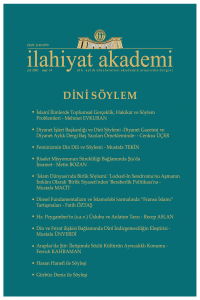Peygamber’e İtaatin Dayanağı Olarak İsmet Meselesi / The Issue of Ismah as the Ground of Obedience to the Prophet / عصمة النبي برهان الاعتصام به
Peygamberler, insanların hidâyeti bulmaları ve bu doğrultuda hayatlarını düzenlemeleri için, Allah tarafından kendileri arasından seçilen ve yine kendilerine gönderilen şahsiyetlerdir. Peygamberlerin işlevlerini yerine getirmeleri için, öncelikle tanınmaları, daha sonra görevleri konusunda güvenilir olmaları ve kendilerine itaat edilmeleri gerekir. Tanınmaları ve güvenilir olmaları, işin tâbiatının gereği ve peygamber olan şahsiyetle ilgili hususlardır. İtaat edilmeleri ise, peygamberlikle amaçlanan hedefin gerçekleşmesi için, peygamberin muhatabı olan kitleyle ilgili bir tercihtir. Ne var ki insanların kendileri gibi başka bir insana kayıtsız şartsız teslim olmaları ve ona itaat etmeleri her zaman kolay değildir. Diğer yandan teslimiyet ve itaat söz konusu olmadığı takdirde de peygamberlikten beklenen neticenin elde edilmesi mümkün değildir. İşte bu engelleri aşmak için peygamberliği bir yöntem olarak belirleyip tercih eden Yüce Allah, peygamberlerin tanınmaları için onları mûcize ile desteklemiş, kendilerine güvenilmesi için de onları ismet sıfatıyla donatmıştır. Bu iki husus peygamberin ümmetini dönüştürme kapasitesini oluşturmakta ve ümmetin aksine mazeret göstermesini engellemektedir. İtaat ise, ümmetin istenilen yönde dönüşmesi için, başlangıçta sahip olması gereken ön şartı teşkil etmektedir. Ümmetin itaatinin meşru bir zeminde olması için, peygamberin peygamberlik iddiasında samimi olması ve bu görevine şahsi hiçbir kaygısını karıştırmaması gerekir. Peygamberlik göreviyle görevlendirilen zâtın, ismet sıfatıyla donatılmış olması, onun görevlendirildiği konu olan Allah’ın dinini yaşama ve bunu hem sözlü olarak hem de fiili olarak tebliğ etme konusunda güvenilirliğini ifade etmektedir. Allah’ın onu mâsûm kılması, onun dinî konularda dinin gerçek sahibi olan Allah’ın iradesinin aksine herhangi bir tasarrufta bulunmayacağı anlamına gelmektedir. İşte başka hiçbir insanda bulunmayan bu özellik nedeniyle peygambere itaat etmek gerekli görülmüştür. Bu makalemizde ismetin mahiyeti, sınırları, itaatin kaynağı olma kapasitesi ve buna bağlı olarak gerçekleşmesi beklenen, mâsûm olan peygambere itaat üzerinde durulacak, ismet ile itaat arasındaki bağlantı irdelenmeye çalışılacaktır.
The Issue of Ismah as the Ground of Obedience to the Prophet
Prophets are individuals who are chosen by Allah from among groups of people to guide them in their quest to put their lives in good order in their search of the true path. In order for prophets to function, they need to be well known and reliable in the performance of their duties, and have the trust of the people. Their recognition and trust are matters directly related to the nature of the work and the personality as a prophet. On the other hand, obedience is an expectation of a prophet’s subjects in order to realize the purpose of the prophecy. However, it is not always easy for people to unconditionally submit to and obey another person who is just like them. On the other hand, lack of submission and obedience would make achieving the purpose of prophecy impossible . Therefore Allah, having created and proffered the means of prophecy in order to overcome such obstacles, supported His prophets with miracles so they would become well known and further bestowed the trait of ismah on them so they would become reliable. Miracles and ismah are the foundations in the capacity of a prophet to transform their ummah, and they also prevent ummah from abstaining from their cause. Obedience constitutes the prerequisite for ummah so they can be transformed in the correct way. In order for the ummah’s obedience to be justified, the prophet’s claim of prophecy must be sincere and they must keep their sentiments separate from their duty. The fact that a person, who is tasked with prophecy, has also been bestowed with the virtue of ismah is proof that the person is able to practice and convey the religion of Allah, orally and verbally, which is the duty with which they have been entrusted. The fact that Allah has made a prophet innocent means that the prophet will not make any sacrifice other than as intended by Allah, who is the true owner of religion. This virtue, which no one else may have, was deemed to be the reason why people must obey the prophet. This article studies ismah’s nature, limits, its capacity to become the foundation for obedience and the corresponding vision of obedience to the innocent prophet, and also examines the connection between ismah and obedience.
Keywords:
Prophet, Ummah, Ismah, Obedience, Transformation,
___
- Celaleddin es-Süyûtî, Tenzihü’l-enbiya an tesfihi’l-ağbiya (nşr. Saîd Muhammed Lehham), Beyrut 1417/1997.
- Cerrahoğlu, İsmail, “Garanik”, DİA, XIII, 363-364.
- Cürcânî, Seyyid Şerif, Şerh’ul-Mevâkıf (nşr. M. Ömer ed-Dimyâtî), Beyrut: Darü’l-kütübi’l-ilmiyye, 1433/2012.
- Cüveynî, İmâmü’l-Haremeyn, el-İrşâd (nşr. M. Yûsuf Mûsâ-Abdülmün’im Abdülhamîd), Kahire 1369/1950.
- Evkuran, Mehmet, Ahlak, Hakikat ve Kimlik, Ankara: Araştırma, 2013.
- İbn Manzûr, Lisânü’l-Arab (nşr. A. Ali el-Kebîr vdğr.), Kahire: Dâru’l-Maârif, ts.
- Kadı Abdülcebbâr, Şerhu’l-Usûli’l-hamse (trc. ve nşr. İlyas Çelebi), İstanbul: YEK Başkanlığı, 2013.
- Kadı Abdülcebbâr, el-Muğni fî ebvâbi’t-tevhîdi ve’l-adl, Kahire 1385/1965.
- Kâşifü’l-Ğitâ, M. Hüseyin Âl, Aslu’ş-Şiâ ve Usûlühâ (nşr. Dâru’l-Usûl), Beyrut 1410/1990.
- Mehmet Bulut, Ehli sünnet ve Şia'da İsmet İnancı, İstanbul 1991.
- Murtaza,Ebü'l-Kâsım Alemülhüda Ali b. Hüseyin Şerif, Tenzihü'l-enbiyâ, Beyrut 1988.
- Mutrifi, Uveyd b. İyâd,Âyâtu itâbi'l-Mustafa fî dav'i'l-ismeti ve'l-ictihâd, Kahire:Dârü'l-Fikri'l-Arabi, ts.
- Nesefî, Ebü’l-Muîn, Tabsiratü’l-edille (nşr. H. Atay-Ş.A. Düzgün), Ankara: DİB, 2003.
- Razî, Fahreddin, İsmetü’l-enbiyâ, Beyrut 1409/1988.
- Sâbûnî Nureddîn, el-Bidâye fî Usûliddîn (nşr. Bekir Topaloğlu), Ankara: DİB, 2005.
- Tehânevî, Muhammed b. Âlâ, Keşşafu ıstılahâti fünûni ve’l-ulûm, Beyrut 1996.
- Topaloğlu, Bekir-Çelebi, İlyas, Kelâm Terimleri Sözlüğü (KTS), İstanbul 2010.
- ISSN: 2149-3979
- Yayın Aralığı: Yılda 2 Sayı
- Başlangıç: 2015
- Yayıncı: Gaziantep Üniversitesi
